Unlock your leadership and management potential
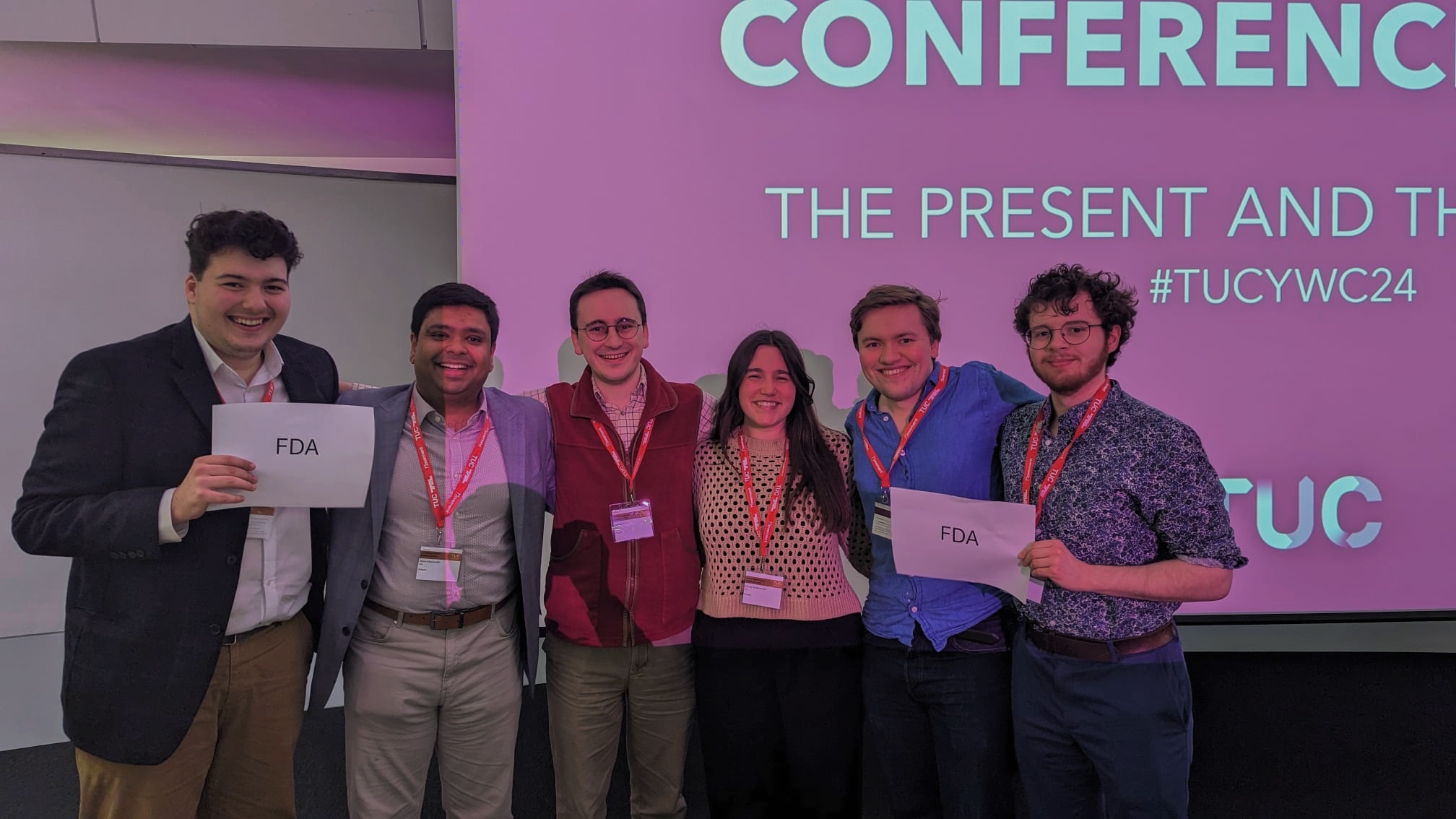
As part of Young Workers’ Month, the FDA highlights how development schemes like the Fast Stream can set young workers up for a successful career in public service, and how the union will support them along the way.
Co-convenors of the FDA Fast Stream section, Dan Marshall and Honey Butterworth, spoke to member Jo Salway about her journey from the Fast Stream to the Senior Civil Service.
The Fast Stream is open to all ages. However, 86% of appointable candidates in the 2024 round of recruitment were aged 26 or under. Marshall, a second year Fast Streamer in the Scottish Government, and Butterworth, a third year Fast Streamer in the Department for Education and member of the TUC Young Workers’ Committee, spoke to a former Fast Streamer about the FDA’s work to support young members and how the Fast Stream helped to shape their career.
Jo Salway is Director of Social Partnership, Employability and Fair Work in the Welsh Government, who joined the Fast Stream straight out of university as a young worker.
Honey Butterworth (HB): Jo, could you tell us about your background, your career and experiences from the Fast Stream?
Jo Salway (JS): I joined the Fast Stream in 1996. I was on the old version of the Fast Stream where you joined a single department and you stayed there for the duration. I graduated from university on 14 July 1996 and I started work on 19 August 1996.
I think in all honesty, I didn’t necessarily even realise what the Fast Stream meant. Quite what the opportunity it was, or the expectations around career progression that I’d then take from there.
The Fast Stream was a great opportunity for me, notwithstanding the fact I didn’t really know what I’d got into, but I think there were two key points for me. One was the range of jobs I got to do. That’s a huge amount of opportunity. Often working on short-term, but very important projects.
The other thing was getting the networks at a very early stage of working with people who were either already very senior or who were going to be progressing up, always a little bit further ahead of me as I went through my career knowing them personally and being able to turn to them for advice or informal mentoring, or hopefully job offers as my career went on.
Dan Marshall (DM): The Fast Stream is often our first time interacting with trade unions. How important do you think it is that Fast Streamers understand the role of a union, their rights in the workplace and the support that’s available to them?
JS: I think it’s really important that everyone understands their rights and I don’t think it’s actually an age-specific question, but I would say to anyone who is joining any employer to check out the union opportunities. I think we went through a period probably in the 1990s, where there was a feeling that a trade union was a political endeavour, and of course it’s not, it’s about representing the voice of workers.
Within my job I co-fund, with the Wales TUC, a scheme called Unions and the World of Work, which is actually about going into schools and starting a conversation very early on with young people about what their rights are, and I think it’s really important that when you go into the world of work, [you know] what you can expect from your employer as well as what they can expect from you. Unions are a really key place to make sure you know that and of course, a really good support, if unfortunately things go wrong… Unions are a very positive place to turn to.
HB: A question we get a lot, especially from new members at the start of their careers, is ‘will joining a union be damaging to my career?’ How would you answer that?
JS: I would probably start with a look of shock and sadness that people would think that that’s the case.
The beauty of union membership is, it’s as public or as private as you want it to be.
You’re under no obligation to ever tell anyone that you’re a member, but equally, if you choose to be more active in the union, there’s a lot of likeminded people that you’re going to meet.
But there’s also protection for us – it’s really fundamental legal protection and a point of principle that being a member should not affect you or have any detrimental effect on your career.
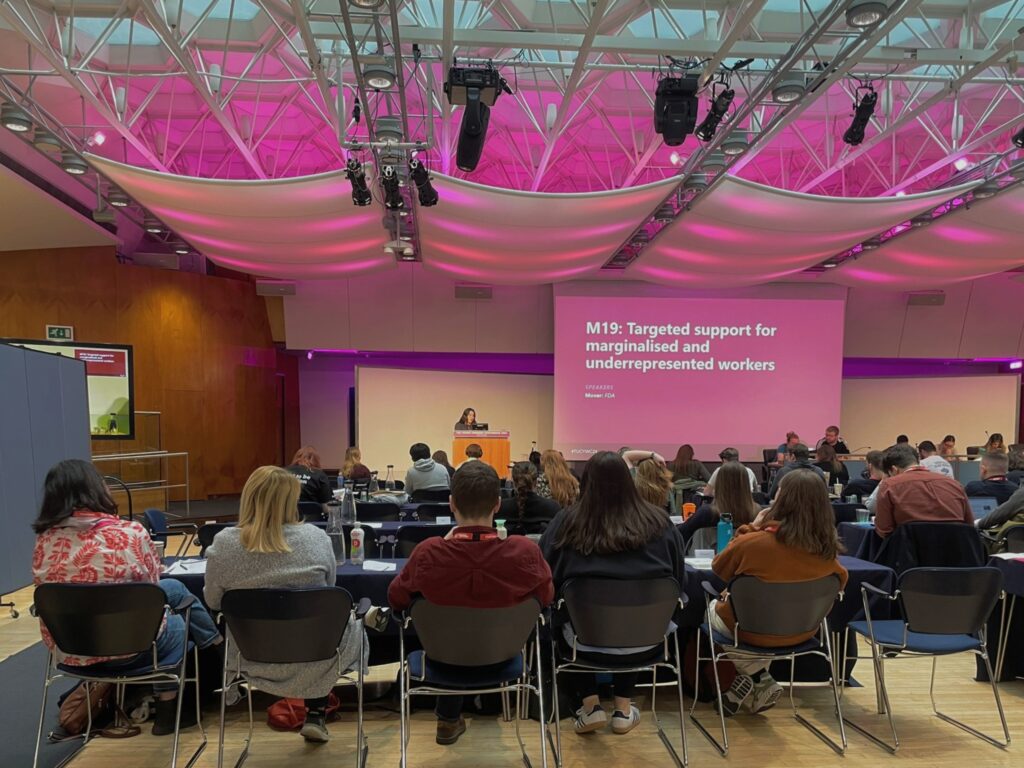
Within my work, one of the things that I would always say is that it’s really important to remember that our union representatives are one of us. They’re held to the same standards of behaviour. Yes, there were going to be situations when they’re having to make quite challenging arguments on our behalf, but [many of us] do that with ministers all the time as well.
We provide advice. We often give difficult truths, and if you fall back on civil service values, if you fall back on good, courteous behaviour in the workplace, there’s no reason at all why you couldn’t take on a more active role and actually earn an awful lot of respect for that, which is something that I’ve seen throughout my career.
If you can go in and tell senior managers very difficult facts and do it in a really lovely way, I think it’s a very good training ground for our wider ministerial engagement.
DM: One of the big things that the FDA is investing in at the moment is learning, development and mentoring opportunities for all members, but particularly for young workers. What was your experience of training and support while you were on the Fast Stream?
JS: I think I’ve always under-invested in my own personal training.
I think I had an awful – verging on arrogance – ‘I can do it on my own’ attitude when I was young and my advice to people is to always take help and support. It’s crazy to think that you can navigate this new world that you don’t really understand.
The unwritten rules are as important as the written rules. Finding your way around the organisation, navigating it – it’s really good to have other people who can help you.
So having under-invested in my own development at critical points in my life, I now spend a lot of time mentoring people because actually, you know, [it’s good] saying to people, you matter. And if you want my experience and my advice, then I will happily give it.
I think my engagement with training now is a lot more mature and one of the things that I think is really important about it is actually giving you time to think about who you are, what your motivations are and what you do. Because there is a risk that if you don’t do that through training, the points at which you start thinking about who you are, what your leadership style is, is when you need to answer questions about it in an interview. And if the answers aren’t right, that’s too late to realise it.
So having that space that is protected to invest in your own development, including reflecting on what you’re doing well and less well, is really key. Now I keep protected time in my diary every week I’ve set myself the objective of learning to speak Welsh and every week there’s an hour in my diary, I don’t sacrifice it. I only move it to a different spot if I have to, because that’s about a personal goal that I’ve set myself. And sending out that message that it is entirely appropriate to ring-fence time in your diary to develop yourself, that’s also in the organisation’s interest.
HB: The final question from us is, do you have any advice for Fast Streamers, but also young workers in general, on how to map a successful career in the civil service?
JS: Yes, I think my advice would probably be don’t get too hung up on mapping it because you just never know what’s around the corner.
I think some of the most interesting jobs that I’ve ever done have been the ones I didn’t seek out, but there were opportunities that arose. They were some of the things that really pushed me out my comfort zone.
They’re the areas where I grew most. I think my time as a private secretary was a really key part of that, and that was a job that I only took because my now-husband was relocating to London and it was a job that I could see had a career development objective, but was also in the right place. But without that sort of driver I probably wouldn’t have got it and I learnt so much about how ministers work and what’s important.
Similarly, I found that sometimes when I take control of my own career, I end up in jobs that look very good on the CV, but are a real nightmare to live through. Because I don’t always know myself as well as other people around me would do.
It’s important to think about how you develop yourself and what gaps you’ve got, but I don’t think we should ever be blind to the benefits of an opportunity that just comes from out of the blue. And you just think actually this is going to be something I want to do.
The other thing that I often think about is how long my career is. I won’t be retiring until I’m in my 60s, probably 67, maybe even later. There’s time in that space to actually think about having a bit of fun along the way and doing jobs that might stretch me, but will also be very good fun. Because there’s plenty of time between now and my retirement. I don’t have to be on a forced pace for all of that time, so working out where I actually want to spend some of my time and also the civil service is very good for pursuing other options and looking into secondments and things like that, and just having a very open mind whilst knowing who you are and what it is that you actually want to contribute.
What is Young Workers’ Month?
Organised by the TUC and held in November every year, Young Workers’ Month promotes trade unions to young workers. It’s an opportunity to campaign on issues affecting young workers and it gives a platform to their organising activities.
Get involved
Become a mentor for the Public Sector Development and Mentoring Scheme (PSDMS) and help improve diversity and social mobility in the civil service.
The FDA offers full training to members currently on schemes such as the Fast Stream and Tax Specialist Programme to become mentors to students, encouraging them to apply for civil service development schemes and other opportunities.
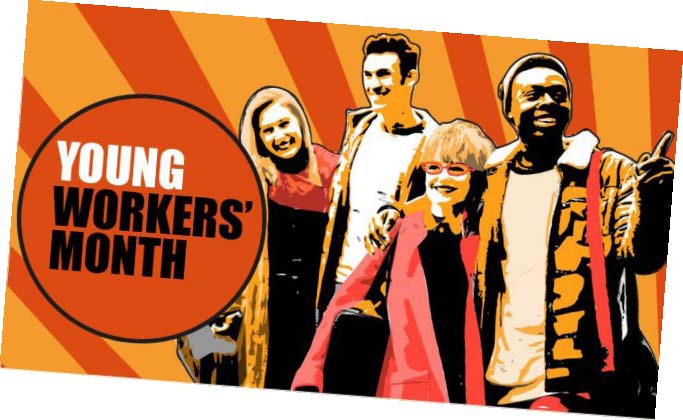
Interested in learning more about becoming a PSDMS mentor?
Contact FDALearn@fda.org.uk
Want to know more about getting involved as a Fast Streamer?
Email faststream@fda.org.uk
Latest news
-

Under-resourced and over-worked
Tom Nathan on the FDA’s report into the financial and administrative challenges present in the justice system, its advice for the new government on increasing prosecutions of Rape and Serious Sexual Offences, and next steps to ensure the union’s message is heard.
-
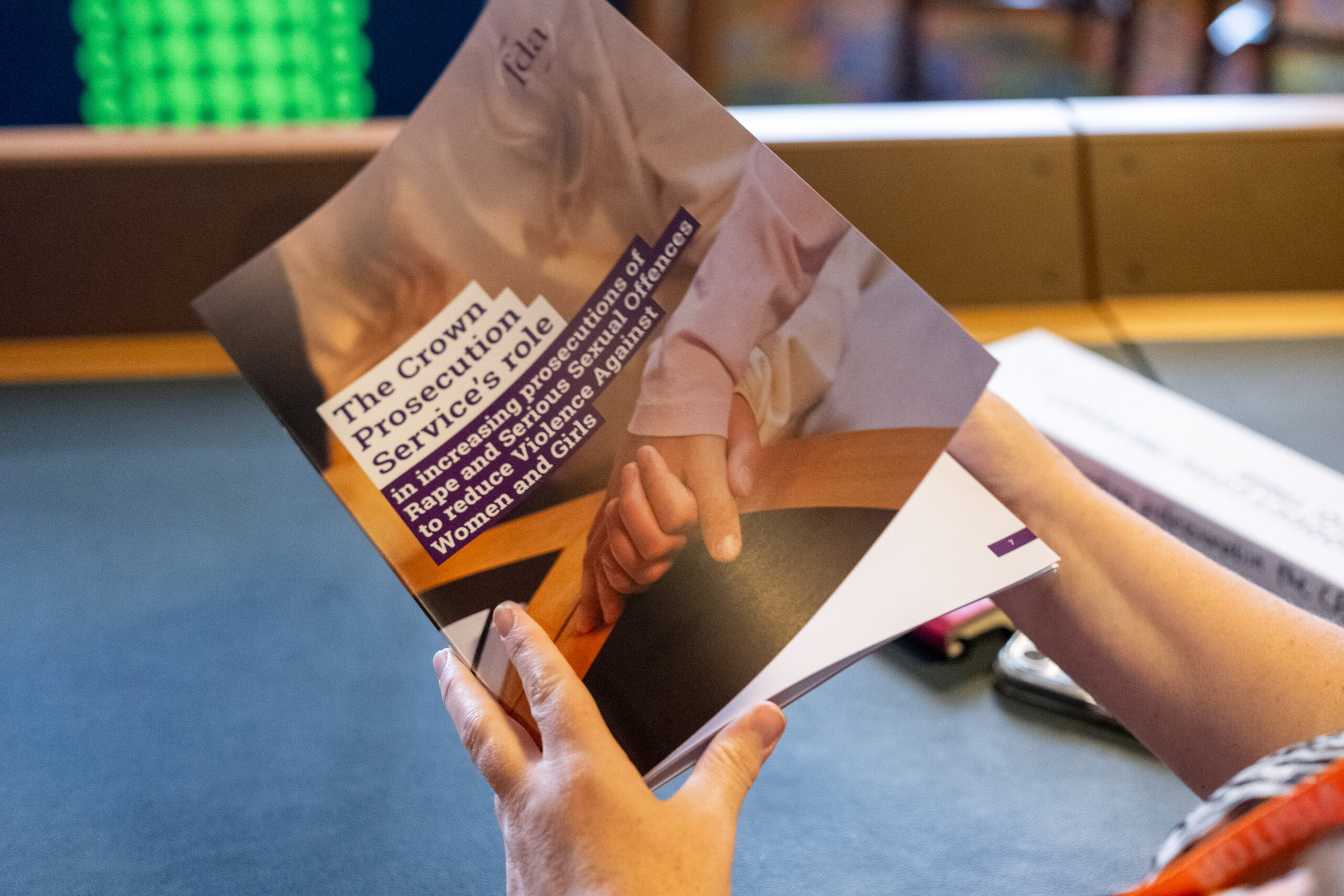
FDA welcomes additional CPS funding to support victims of crime
The FDA has welcomed that the CPS will be receiving additional resources. The announcement follows the recent publication of the FDA’s report examining the CPS’s role in increasing RASSO prosecutions.
-
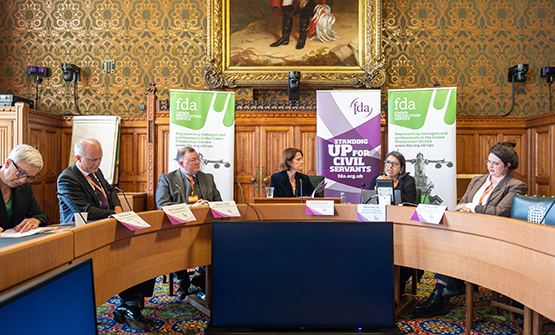
CPS must have additional resourcing to increase RASSO prosecutions, Parliamentary event hears
Last week in Parliament the FDA launched a new report calling for consistent direction of policy and additional resourcing of the justice system, in order to increase prosecutions of serious sexual offences.